Jurgen (23)
By:
August 17, 2015
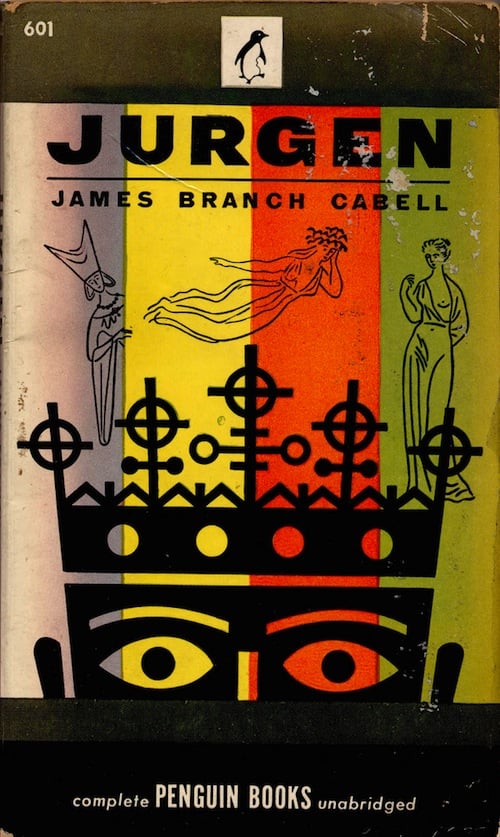
James Branch Cabell’s 1919 ironic fantasy novel Jurgen, A Comedy of Justice, the protagonist of which seduces women everywhere he travels — including into Arthurian legend and Hell itself — is (according to Aleister Crowley) one of the “epoch-making masterpieces of philosophy.” Cabell’s sardonic inversion of romantic fantasy was postmodernist avant la lettre. HiLoBooks is pleased to serialize Jurgen here at HILOBROW. Enjoy!
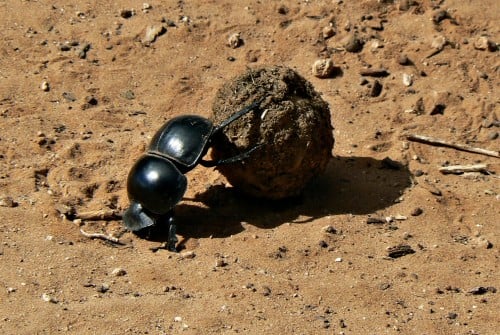
So it was that Jurgen came into Cocaigne, wherein is the bedchamber of Time. And Time, they report, came in with Jurgen, since Jurgen was mortal: and Time, they say, rejoiced in this respite from the slow toil of dilapidating cities stone by stone, and with his eyes tired by the finicky work of etching in wrinkles, went happily into his bedchamber, and fell asleep just after sunset on this fine evening in late June: so that the weather remained fair and changeless, with no glaring sun rays anywhere, and with one large star shining alone in clear daylight. This was the star of Venus Mechanitis, and Jurgen later derived considerable amusement from noting how this star was trundled about the dome of heaven by a largish beetle, named Khepre. And the trees everywhere kept their first fresh foliage, and the birds were about their indolent evening songs, all during Jurgen’s stay in Cocaigne, for Time had gone to sleep at the pleasantest hour of the year’s most pleasant season. So tells the tale.
And Jurgen’s shadow also went in with Jurgen, but in Cocaigne as in Glathion, nobody save Jurgen seemed to notice this curious shadow which now followed Jurgen everywhere.
In Cocaigne Queen Anaïtis had a palace, where domes and pinnacles beyond numbering glimmered with a soft whiteness above the top of an old twilit forest, wherein the vegetation was unlike that which is nourished by ordinary earth. There was to be seen in these woods, for instance, a sort of moss which made Jurgen shudder. So Anaïtis and Jurgen came through narrow paths, like murmuring green caverns, into a courtyard walled and paved with yellow marble, wherein was nothing save the dimly colored statue of a god with ten heads and thirty-four arms: he was represented as very much engrossed by a woman, and with his unoccupied hands was holding yet other women.
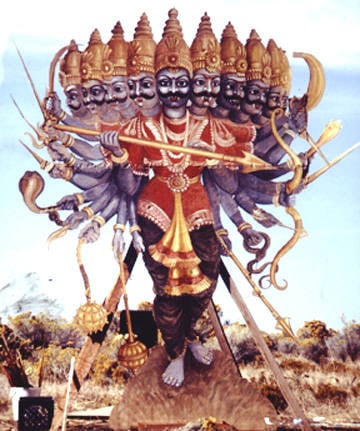
“It is Jigsbyed,” said Anaïtis.
Said Jurgen: “I do not criticize. Nevertheless, I think this Jigsbyed is carrying matters to extremes.”
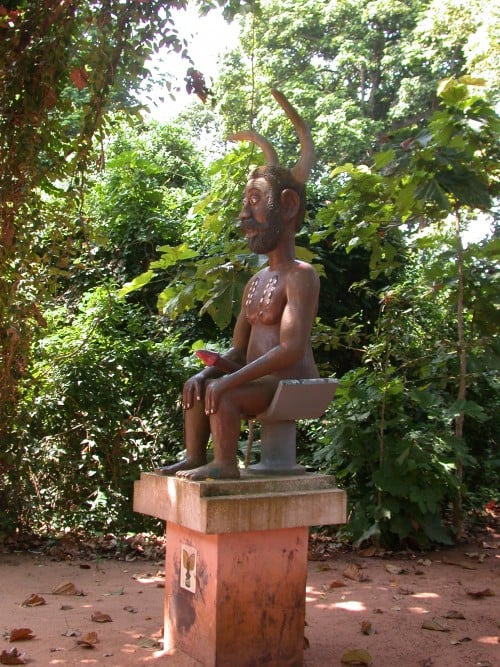
Then they passed the statue of Tangaro Loloquong, and afterward the statue of Legba. Jurgen stroked his chin, and his color heightened. “Now certainly, Queen Anaïtis,” he said, “you have unusual taste in sculpture.”
Thence Jurgen came with Anaïtis into a white room, with copper plaques upon the walls, and there four girls were heating water in a brass tripod. They bathed Jurgen, giving him astonishing caresses meanwhile — with the tongue, the hair, the finger-nails, and the tips of the breasts, — and they anointed him with four oils, then dressed him again in his glittering shirt. Of Caliburn, said Anaïtis, there was no present need: so Jurgen’s sword was hung upon the wall.
These girls brought silver bowls containing wine mixed with honey, and they brought pomegranates and eggs and barleycorn, and triangular red-colored loaves, whereon they sprinkled sweet-smelling little seeds with formal gestures. Then Anaïtis and Jurgen broke their fast, eating together while the four girls served them.
“And now,” says Jurgen, “and now, my dear, I would suggest that we enter into the pursuit of those curious pleasures of which you were telling me.”
“I am very willing,” responded Anaïtis, “since there is no one of these pleasures but is purchased by some diversion of man’s nature. Yet first, as I need hardly inform you, there is a ceremonial to be observed.”
“And what, pray, is this ceremonial?”
“Why, we call it the Breaking of the Veil.” And Queen Anaïtis explained what they must do.
“Well,” says Jurgen, “I am willing to taste any drink once.”
So Anaïtis led Jurgen into a sort of chapel, adorned with very unchurchlike paintings. There were four shrines, dedicated severally to St. Cosmo, to St. Damianus, to St. Guignole of Brest, and to St. Foutin de Varailles. In this chapel were a hooded man, clothed in long garments that were striped with white and yellow, and two naked children, both girls. One of the children carried a censer: the other held in one hand a vividly blue pitcher half filled with water, and in her left hand a cellar of salt.
First of all, the hooded man made Jurgen ready. “Behold the lance,” said the hooded man, “which must serve you in this adventure.”
“I accept the adventure,” Jurgen replied, “because I believe the weapon to be trustworthy.”
Said the hooded man: “So be it! but as you are, so once was I.”
Meanwhile Duke Jurgen held the lance erect, shaking it with his right hand. This lance was large, and the tip of it was red with blood.
“Behold,” said Jurgen, “I am a man born of a woman incomprehensibly. Now I, who am miraculous, am found worthy to perform a miracle, and to create that which I may not comprehend.”
Anaïtis took salt and water from the child, and mingled these. “Let the salt of earth enable the thin fluid to assume the virtue of the teeming sea!”
Then, kneeling, she touched the lance, and began to stroke it lovingly. To Jurgen she said: “Now may you be fervent of soul and body! May the endless Serpent be your crown, and the fertile flame of the sun your strength!”
Said the hooded man, again: “So be it!” His voice was high and bleating, because of that which had been done to him.
“That therefore which we cannot understand we also invoke,” said Jurgen. “By the power of the lifted lance” — and now with his left hand he took the hand of Anaïtis, — “I, being a man born of a woman incomprehensibly, now seize upon that which alone I desire with my whole being. I lead you toward the east. I upraise you above the earth and all the things of earth.”
Then Jurgen raised Queen Anaïtis so that she sat upon the altar, and that which was there before tumbled to the ground. Anaïtis placed together the tips of her thumbs and of her fingers, so that her hands made an open triangle; and waited thus. Upon her head was a network of red coral, with branches radiating downward: her gauzy tunic had twenty-two openings, so as to admit all imaginable caresses, and was of two colors, being shot with black and crimson curiously mingled: her dark eyes glittered and her breath came fast.
Now the hooded man and the two naked girls performed their share in the ceremonial, which part it is not essential to record. But Jurgen was rather shocked by it.
None the less, Jurgen said: “O cord that binds the circling of the stars! O cup which holds all time, all color, and all thought! O soul of space! not unto any image of thee do we attain unless thy image show in what we are about to do. Therefore by every plant which scatters its seed and by the moist warm garden which receives and nourishes it, by the comminglement of bloodshed with pleasure, by the joy that mimics anguish with sighs and shudderings, and by the contentment which mimics death, — by all these do we invoke thee. O thou, continuous one, whose will these children attend, and whom I now adore in this fair-colored and soft woman’s body, it is thou whom I honor, not any woman, in doing what seems good to me: and it is thou who art about to speak, and not she.”
Then Anaïtis said: “Yea, for I speak with the tongue of every woman, and I shine in the eyes of every woman, when the lance is lifted. To serve me is better than all else. When you invoke me with a heart wherein is kindled the serpent flame, if but for a moment, you will understand the delights of my garden, what joy unwordable pulsates therein, and how potent is the sole desire which uses all of a man. To serve me you will then be eager to surrender whatever else is in your life: and other pleasures you will take with your left hand, not thinking of them entirely: for I am the desire which uses all of a man, and so wastes nothing. And I accept you, I yearn toward you, I who am daughter and somewhat more than daughter to the Sun. I who am all pleasure, all ruin, and a drunkenness of the inmost sense, desire you.”
Now Jurgen held his lance erect before Anaïtis. “O secret of all things, hidden in the being of all which lives, now that the lance is exalted I do not dread thee: for thou art in me, and I am thou. I am the flame that burns in every beating heart and in the core of the farthest star. I too am life and the giver of life, and in me too is death. Wherein art thou better than I? I am alone: my will is justice: and there comes no other god where I am.”
Said the hooded man behind Jurgen: “So be it! but as you are, so once was I.”
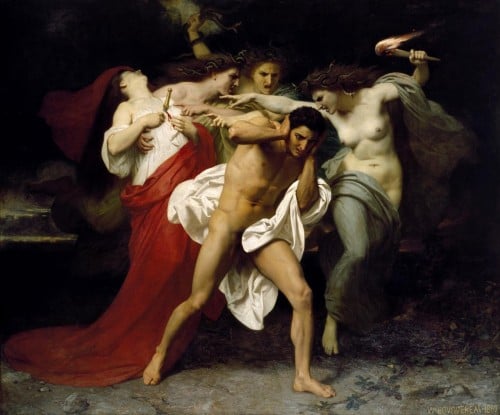
The two naked children stood one at each side of Anaïtis, and waited there trembling. These girls, as Jurgen afterward learned, were Alecto and Tisiphonê, two of the Eumenidês. And now Jurgen shifted the red point of the lance, so that it rested in the open triangle made by the fingers of Anaïtis.
“I am life and the giver of life,” cried Jurgen. “Thou that art one, that makest use of all! I who am a man born of woman, I in my station honor thee in honoring this desire which uses all of a man. Make open therefore the way of creation, encourage the flaming dust which is in our hearts, and aid us in that flame’s perpetuation! For is not that thy law?”
Anaïtis answered: “There is no law in Cocaigne save, Do that which seems good to you.”
Then said the naked children: “Perhaps it is the law, but certainly it is not justice. Yet we are little and quite helpless. So presently we must be made as you are for now you two are no longer two, and your flesh is not shared merely with each other. For your flesh becomes our flesh, and your sins our sins: and we have no choice.”
Jurgen lifted Anaïtis from the altar, and they went into the chancel and searched for the adytum. There seemed to be no doors anywhere in the chancel: but presently Jurgen found an opening screened by a pink veil. Jurgen thrust with his lance and broke this veil. He heard the sound of one brief wailing cry: it was followed by soft laughter. So Jurgen came into the adytum.
Black candles were burning in this place, and sulphur too was burning there, before a scarlet cross, of which the top was a circle, and whereon was nailed a living toad. And other curious matters Jurgen likewise noticed.
He laughed, and turned to Anaïtis: now that the candles were behind him, she was standing in his shadow. “Well, well! but you are a little old-fashioned, with all these equivocal mummeries. And I did not know that civilized persons any longer retained sufficient credulity to wring a thrill from god-baiting. Still, women must be humored, bless them! and at last, I take it, we have quite fairly fulfilled the ceremonial requisite to the pursuit of curious pleasures.”
Queen Anaïtis was very beautiful, even under his bedimming shadow. Triumphant too was the proud face beneath that curious coral network, and yet this woman’s face was sad.
“Dear fool,” she said, “it was not wise, when you sang of the Léshy, to put an affront upon Monday. But you have forgotten that. And now you laugh because that which we have done you do not understand: and equally that which I am you do not understand.”
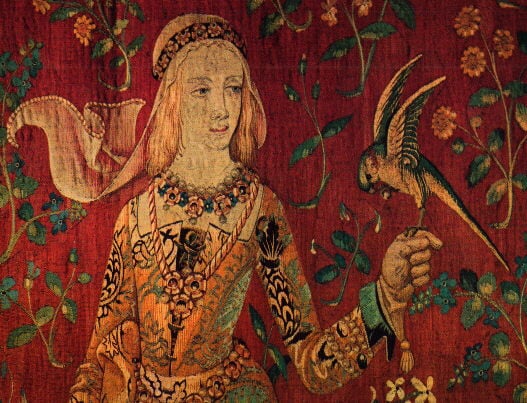
“No matter what you may be, my dear, I am sure that you will presently tell me all about it. For I assume that you mean to deal fairly with me.”
“I shall do that which becomes me, Duke Jurgen —”
“That is it, my dear, precisely! You intend to be true to yourself, whatever happens. The aspiration does you infinite honor, and I shall try to help you. Now I have noticed that every woman is most truly herself,” says Jurgen, oracularly, “in the dark.”
Then Jurgen looked at her for a moment, with twinkling eyes: then Anaïtis, standing in his shadow, smiled with glowing eyes: then Jurgen blew out those black candles: and then it was quite dark.
Footnotes from Notes on Jurgen (1928), by James P. Cover — with additional comments from the creators of this website; rewritten, in some instances, by HiLoBooks.
The ritual here parodies Aleister Crowley’s “Ecclesiæ Gnosticæ Catholicæ Canon Missæ” (Gnostic Mass).
* Venus Mechanitis — That is, Venus the Contriver, usually of unnatural devices.
* Khepre — Kheperi was the Egyptian name for the dung beetle, or tumblebug, which lays its egg in a ball of dung and compacts the pellet by rolling it up hill with its hind legs and allowing it to roll back down again. The Egyptians compared the pellet to the sun, and held the insect sacred to the sun-god. It is the original of the well-known scarab. In the sixty-second chapter of The Silver Stallion, this beetle again appears, under the name of Khypera, and shapes a world much after the same fashion as the Egyptians thought this world to have been shaped.
* Jigsbyed — This was probably one of the demons worshiped by some of the disciples of Lamaism, a corrupt form of Buddhism once prevalent in Tibet. Statuettes of the god, similar to the one here described, actually existed.
* Tangaro Loloquong — In Melanesian mythology, Tangaro Loloquong, the Fool, is the eleventh and youngest brother of Qat, the chief god. All that Qat does, Tangaro Loloquong tries to undo.
* Legba — Legba is the love god of Dahomey, a French colony in West Africa. He is represented by a phallus, and the honey bees, nature’s fertilizers, are his messengers. The worship of the gods of Dahomey was of a licentious description, and wholesale human sacrifices were of frequent occurrence.
* St. Cosmo and St. Damianus — Cosmo and Damianus were brothers who lived in the third and fourth centuries. They were brought up Christians, received an excellent education, and entered the medical profession because they could thus most benefit their fellows. They were put to death with extreme tortures during the persecution by Diocletian, A.D. 303-311.
* St. Guignole — Guignole was a saint born in the Armorique [Brittany] of a family of Gaulish princes. He founded the monastery of Landevenec, near Brest, and submitted his body to the most extreme austerities.
* St. Foutin de Varailles — This was a French saint whose name so closely resembles a certain indelicate word [foutre] as to give rise to embarrassing legends.
* Eumenidês — Eumenidês, meaning “the good tempered goddesses,” was a name given to the Furies by the Greeks, who considered it bad policy to call them by their right name of Erinyes. They were Tisiphonê, Alecto and Megaera.
* “There is no law in Cocaigne save, Do that which seems good to you.” — This sounds like the “Wiccan Rede”: “An it harm none, do what thou wilt.” The original source for at least part of the Wiccan Rede appears to be by a 16th century novelist, François Rabelais. This concept appears to have been adopted by Aleister Crowley in his Law of Thelema which is contained in his 1904 book Liber AL vel Legis (The Book of the Law).
RADIUM AGE SCIENCE FICTION: “Radium Age” is HILOBROW’s name for the 1904–33 era, which saw the discovery of radioactivity, the revelation that matter itself is constantly in movement — a fitting metaphor for the first decades of the 20th century, during which old scientific, religious, political, and social certainties were shattered. This era also saw the publication of genre-shattering writing by Edgar Rice Burroughs, Sax Rohmer, E.E. “Doc” Smith, Jack London, Arthur Conan Doyle, Aldous Huxley, Olaf Stapledon, Karel Čapek, H.P. Lovecraft, Charlotte Perkins Gilman, Yevgeny Zamyatin, Philip Gordon Wylie, and other pioneers of post-Verne/Wells, pre-Golden Age “science fiction.” More info here.
READ GORGEOUS PAPERBACKS: HiLoBooks has reissued the following 10 obscure but amazing Radium Age science fiction novels in beautiful print editions: Jack London’s The Scarlet Plague, Rudyard Kipling’s With the Night Mail (and “As Easy as A.B.C.”), Arthur Conan Doyle’s The Poison Belt, H. Rider Haggard’s When the World Shook, Edward Shanks’ The People of the Ruins, William Hope Hodgson’s The Night Land, J.D. Beresford’s Goslings, E.V. Odle’s The Clockwork Man, Cicely Hamilton’s Theodore Savage, and Muriel Jaeger’s The Man with Six Senses. For more information, visit the HiLoBooks homepage.
SERIALIZED BY HILOBOOKS: Jack London’s The Scarlet Plague | Rudyard Kipling’s With the Night Mail (and “As Easy as A.B.C.”) | Arthur Conan Doyle’s The Poison Belt | H. Rider Haggard’s When the World Shook | Edward Shanks’ The People of the Ruins | William Hope Hodgson’s The Night Land | J.D. Beresford’s Goslings | E.V. Odle’s The Clockwork Man | Cicely Hamilton’s Theodore Savage | Muriel Jaeger’s The Man With Six Senses | Jack London’s “The Red One” | Philip Francis Nowlan’s Armageddon 2419 A.D. | Homer Eon Flint’s The Devolutionist | W.E.B. DuBois’s “The Comet” | Edgar Rice Burroughs’s The Moon Men | Charlotte Perkins Gilman’s Herland | Sax Rohmer’s “The Zayat Kiss” | Eimar O’Duffy’s King Goshawk and the Birds | Frances Hodgson Burnett’s The Lost Prince | Morley Roberts’s The Fugitives | Helen MacInnes’s The Unconquerable | Geoffrey Household’s Watcher in the Shadows | William Haggard’s The High Wire | Hammond Innes’s Air Bridge | James Branch Cabell’s Jurgen | John Buchan’s “No Man’s Land” | John Russell’s “The Fourth Man” | E.M. Forster’s “The Machine Stops” | John Buchan’s Huntingtower | Arthur Conan Doyle’s When the World Screamed | Victor Bridges’ A Rogue By Compulsion | Jack London’s The Iron Heel | H. De Vere Stacpoole’s The Man Who Lost Himself | P.G. Wodehouse’s Leave It to Psmith | Richard Connell’s “The Most Dangerous Game” | Houdini and Lovecraft’s “Imprisoned with the Pharaohs” | Arthur Conan Doyle’s “The Sussex Vampire.”
ORIGINAL FICTION: HILOBROW has serialized three novels: James Parker’s The Ballad of Cocky The Fox (“a proof-of-concept that serialization can work on the Internet” — The Atlantic); Karinne Keithley Syers’s Linda Linda Linda (which includes original music); and Robert Waldron’s roman à clef The School on the Fens. We also publish original stories and comics. These include: Matthew Battles’s stories “Gita Nova“, “Makes the Man,” “Imago,” “Camera Lucida,” “A Simple Message”, “Children of the Volcano”, “The Gnomon”, “Billable Memories”, “For Provisional Description of Superficial Features”, “The Dogs in the Trees”, “The Sovereignties of Invention”, and “Survivor: The Island of Dr. Moreau”; several of these later appeared in the collection The Sovereignties of Invention | Peggy Nelson’s “Mood Indigo“, “Top Kill Fail“, and “Mercerism” | Annalee Newitz’s “The Great Oxygen Race” | Flourish Klink’s Star Trek fanfic “Conference Comms” | Charlie Mitchell’s “A Fantasy Land” | Charlie Mitchell’s “Sentinels” | Joshua Glenn’s “The Lawless One”, and the mashup story “Zarathustra vs. Swamp Thing” | Adam McGovern and Paolo Leandri’s Idoru Jones comics | John Holbo’s “Sugarplum Squeampunk” | “Another Corporate Death” (1) and “Another Corporate Death” (2) by Mike Fleisch | Kathryn Kuitenbrouwer and Frank Fiorentino’s graphic novel “The Song of Otto” (excerpt) | John Holbo’s graphic novel On Beyond Zarathustra (excerpt) | “Manoj” and “Josh” by Vijay Balakrishnan | “Verge” by Chris Rossi, and his audio novel Low Priority Hero | EPIC WINS: THE ILIAD (1.408-415) by Flourish Klink | EPIC WINS: THE KALEVALA (3.1-278) by James Parker | EPIC WINS: THE ARGONAUTICA (2.815-834) by Joshua Glenn | EPIC WINS: THE MYTH OF THE ELK by Matthew Battles | TROUBLED SUPERHUMAN CONTEST: Charles Pappas, “The Law” | CATASTROPHE CONTEST: Timothy Raymond, “Hem and the Flood” | TELEPATHY CONTEST: Rachel Ellis Adams, “Fatima, Can You Hear Me?” | OIL SPILL CONTEST: A.E. Smith, “Sound Thinking | LITTLE NEMO CAPTION CONTEST: Joe Lyons, “Necronomicon” | SPOOKY-KOOKY CONTEST: Tucker Cummings, “Well Marbled” | INVENT-A-HERO CONTEST: TG Gibbon, “The Firefly” | FANFICTION CONTEST: Lyette Mercier’s “Sex and the Single Superhero”
